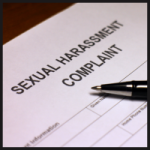Employers have a positive obligation to ensure the health and safety of workers, this includes psychological health. All employees have a right to a workplace that is free from discrimination and harassment, including sexual harassment. You must take reasonable steps to prevent or minimise these behaviours in your workplace.
Discrimination
Unlawful discrimination means treating one person or group of people less favourably than another, or causing them disadvantage, in certain circumstances.
Discrimination can occur pre-employment, during employment and at the time of termination of employment.
Harassment and Sexual Harassment
Workplace harassment is unwelcome conduct that is not wanted or asked for; offends, intimidates or humiliates the person concerned and is based on one of the grounds for unlawful discrimination – such as a person’s race, age, religion, disability, sexual orientation, gender, etc. It can be physical, verbal or non-verbal conduct.
Sexual harassment is ‘harassment’ of a sexual nature and is the most common form of harassment. It includes but is not limited to: inappropriate sexual connotations in conversations; sexual advances both verbal and physical; unwanted physical contact; sexual jokes; sending sexual images; unwelcome comments or questions about a person’s sex life; and much more, including sexual assault.
Common mistakes we see with discrimination and harassment:
- An absent or badly drafted Discrimination and Harassment Policy.
- A Discrimination and Harassment Policy that is not complied with or is inconsistently applied.
- Lake of understanding amongst employees about what conduct is acceptable at work.
- Lack of training for employees and managers in the Discrimination and Harassment Policy
- Not investigating a complaint immediately and/or thoroughly.
- Not engaging external investigators where appropriate.
- Assuming that conduct amongst employee that occurs outside of work hours is not an employment issue.
Key risks of getting it wrong
Employers are generally held to be vicariously liable for the conduct of their employees. This is even more so, where there is a lack of policies and training provided to employees in relation to those policies.
Employers and individuals – including employees, managers and directors – found to have engaged in unlawful discrimination or harassment can be ordered to pay a significant amount of compensation to the complainant. Where the claim is commenced by the employee under the General Protection provisions in the Fair Work Act 2009 (Cth), they may also be penalised up to $63,000 for each breach for a corporation and $12,600 for an individual involved in the breach.
How can we help you?
Allegations of discrimination and harassment must be taken seriously and treated sensitively, confidentially and impartially. If an employee makes a complaint alleging discrimination or harassment, it is imperative that you act promptly and investigate the grievance thoroughly and in accordance with relevant policies and procedures.
Our experienced Employment Lawyers can help by:
- Preparing a Discrimination and Harassment Policy;
- Providing training in relation to your Discrimination and Harassment Policy;
- Providing guidance on how to manage a specific complaint alleging discrimination, harassment, including sexual harassment;
- Advising on risks in relation to a specific complaint of this kind;
- Conducting an independent investigation into a complaint and preparing a report on the outcome;
- Advising on how to manage an employee found to have engaged in unlawful discrimination or harassment in the workplace;
- Advising on a formal complaint filed with the relevant Anti-Discrimination Tribunal, Federal Court, Federal Circuit Court, Fair Work Commission, or the Human Rights and Equal Opportunity Tribunal (‘Tribunal‘);
- Representing you in defending a complaint filed in the Tribunal; and
- Negotiating a settlement of a formal complaint in circumstances where a settlement is warranted, including preparing a Deed of Settlement and Release






